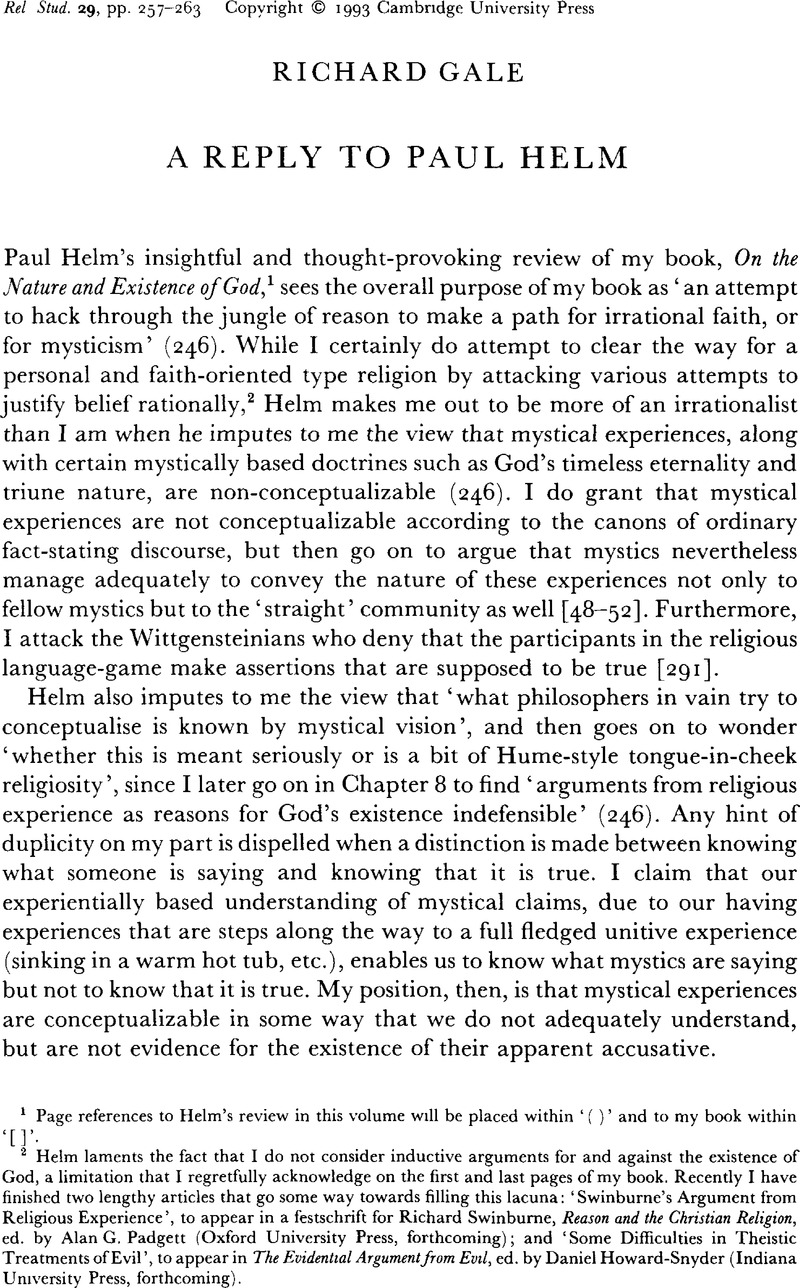Article contents
A Reply to Paul Helm
Published online by Cambridge University Press: 24 October 2008
Abstract

- Type
- Review Article
- Information
- Copyright
- Copyright © Cambridge University Press 1993
References
1 Page references to Helm's review in this volume will be placed within ‘()’ and to my book within ‘[]’.
2 Helm laments the fact that I do not consider inductive arguments for and against the existence of God, a limitation that I regretfully acknowledge on the first and last pages of my book. Recently I have finished two lengthy articles that go some way towards filling this lacuna: ‘Swinburne's Argument from Religious Experience’, to appear in a festschrift for Richard Swinburne, Reason and the Christian Religion, ed. by Alan G. Padgett (Oxford University Press, forthcoming);Google Scholar and ‘Some Difficulties in Theistic Treatments of Evil’, to appear in The Evidential Argument from Evil, ed. by Daniel Howard-Snyder (Indiana University Press, forthcoming)Google Scholar.
3 Helm paraphrases this argument in a way that confounds it with Zeno's metrical paradox of extension when he says that ‘for Augustine the present is timeless and both future and past are constructed out of past presents and future presents. Innumerable zeros are still zero’ (247). While both arguments take the present to be of zero duration, and thus could be neutralized if it could be shown that the present has a finite duration, there are solutions to the paradox of extension, such as those that appeal to the Cantorean continuum, that would not apply to the disappearance of time paradox.
4 I fail to see how Helm could reconcile the claim that for any A-proposition God knows a B-proposition that entails it with his admission that ‘God cannot know any A-proposition to be true for himself’ (249). For any B-proposition, God, being omniscient, knows both it and that it entails a certain A-proposition, and thereby knows the A-proposition in virtue of the principle that anyone who knows (p and p entails q) also knows q.
5 Certainly, Helm should be aware that the ‘authorities’ he appeals to, notably McGinn and Lewis, hold views that are targets of my polemics.
6 Not only does Helm try to make the concept of a timelessly eternal being less unpalatable through this negative approach, he also tries to show how by the doctrine of the Trinity such a being could be religiously available to time-bound beings (249). The problem with this, as I point out in my book, is that this doctrine, if judged by the logic of ordinary language, is contradictory, because it says that the three persons are numerically one and the same and yet do not have all their properties in common [55]. It is an identity that is not really an identity.
7 The exception to this is Helm's textually inaccurate remark that ‘in their claims for the evidential value of religious experience proponents such as Alston and Swinburne are not claiming [as I claim them to be] … that there are non-inferential experiences of God’ (252). Pace Helm, Alston comes right out and says, ‘I will propose a conception of the “direct” perception of an object that I take to be exemplified by our ordinary perception.… I shall then extend this to the putative experience of God, suggesting that this exhibits the same generic structure as the former’ (‘The Perception of God’, Philosophical Topics, XVI (1988), 25)Google Scholar.
8 They are the aforementioned article for the Swinburne festschrift and ‘Why Alston's Mystical Doxastic Practice Is Subjective’, which is forthcoming in the Philosophy and Phenomenological Research symposium on Alston's Perceiving God.
- 1
- Cited by




